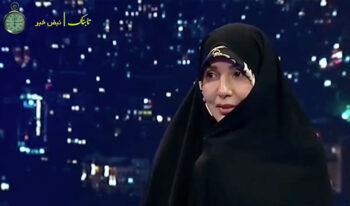“Iran belongs to Hezbollahis.”

These words, from the director of a Quranic institute near the Iranian capital, broadcasted recently on state TV, garnered widespread reaction and criticism from various quarters, including some former government ministers whom the interviewee specifically criticised.
During the interview on 4 November, Mansoureh Masoumi-Asl criticised the broadcaster for including among its guests two relatively liberal former ministers: Mohammad-Javad Azari-Jahromi, who served as Information Minister under Hassan Rouhani, and Mohammad-Ali Abtahi, who was vice president under reformist president Muhammad Khatami.
Masoumi-Asl previously claimed that Iran will become a “heaven on earth” in a few years if it continues on the path set by the current hardline regime. She also criticised the education system, suggesting the recent protests, dominated by the younger generation, were a result of failings in this regard.
Both ministers responded to her criticism via social media, with Azari-Jahromi saying that “Iran belongs to all its citizens” and “not all Muslims align themselves with Hezbollahis”, while Abtahi said Masoumi-Asl “considers the country her own, and hers alone”.
It is important to note that “Hezbollahis” in Iran and the political party in Lebanon are not one and the same, even though both are supported by the Islamic Republic and uphold Iran’s theocracy.
In Iran, “Hezbollahis” don’t belong to a formal political party or organised institution. Instead, since the Islamic Revolution of 1979, the term has been widely used to refer to individuals and institutions in Iranian society who support the regime.
Early on, regime supporters, with slogans like “Hezbollah is the only party” and “Ruhollah is the leader” – referring to the founder of the Islamic Republic, Ayatollah Ruhollah Khomeini – targeted anyone considered anti-regime: from political activists to students and women resisting compulsory hijab.
“Hezbollahis” therefore enjoyed immunity as a repressive force, officially or unofficially, becoming a tool against Iranian civil society and dissidents.
Khomeini regretted not suppressing opposing parties swiftly after the revolution, proclaiming that there is only one party: “Hezbollah” – literally, “the Party of God”, or those who follow the way of Allah. Then in 2019, Khomeini’s successor as Supreme Leader, Ali Khamenei, reiterated that these “Hezbollahis” were the solution to the country’s problems, further increasing the term’s association with the Islamic Republic.
“We are a united nation” – a phrase attributed to Khomeini – is often misconstrued to emphasise national cohesion across religious groups. However, historical records indicate that Khomeini used this phrase to describe the unity of Muslims alone, particularly in connection with Islamic scholar Fazlullah Nouri, who preached that adherence to Islamic law was more important than any law decided upon by parliament.
But while they continue to hold the reins of power in Iran, Hezbollahis remain a clear minority, as indicated by a recent survey by an Iranian newspaper, which revealed that nearly 85% of more than 12,000 respondents were against mandatory hijab.
This kind of survey underscores the significant challenge posed by movements like the “Women, Life, Freedom” protests to the dominance of Khomeini’s and Hezbollahi ideology, particularly concerning women’s rights, over the past 45 years.
Meanwhile, the claim that the country belongs to “Hezbollahis” neglects the sacrifices made by Iranians from various religious and ethnic backgrounds during the Iran-Iraq War, while efforts to address the disparity between Muslims and non-Muslims in the law have faced opposition based on religious opinions.
Former President Hassan Rouhani was also critical of the majority being ruled by the minority in Iran, questioning the practicality of handing over all facilities and responsibilities to a few million people, leaving the rest unemployed or forced to leave the country.
However, it should also be noted that Rouhani, Abtahi, and Azari-Jahromi became part of the fabric of a regime that ostracises the millions of Iranians who are not considered citizens due to their religious beliefs – such as Baha’is, Christian converts, Mandaeans, and Yarsanis.
Even officially recognised minorities face discrimination, with Jews, Zoroastrians, and Armenian and Assyrian Christians denied many rights enjoyed by Shiite Muslim citizens. — Article 18






